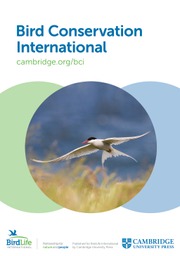Article contents
An update on the distribution of the ‘Endangered’ White-eared Night Heron Gorsachius magnificus in China
Published online by Cambridge University Press: 13 March 2007
Abstract
The literature on the past distribution and status of the White-eared Night Heron in China is reviewed, and updated based on recent field investigations and reports from Hubei, Jiangxi, Guangxi, Guangdong and Hainan. Recent records reveal the species to be more widespread than previously thought, but there remain many uncertainties about the area of occupancy and connectivity between known populations. The rate of discovery of new sites suggests the species may be under-recorded, but a number of recent sites have been lost, and no truly secure populations are known. There thus remains an urgent need for better information from throughout the species' range, especially from historical sites, as well as increased protection.
- Type
- Articles
- Information
- Copyright
- BirdLife International 2007
- 6
- Cited by


